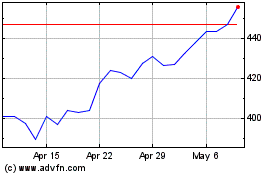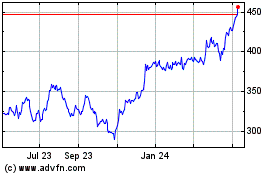U.S. Financial Stocks Fall
February 08 2016 - 3:20PM
Dow Jones News
U.S. financial stocks fell Monday, as investors worried that
banks could be hurt by low energy prices and slowing economic
growth around the world.
Financial stocks in the S&P 500 fell 3.7%, more than the
broader market. The sector is the worst performer in the index so
far in 2016, falling more than 16%. The KBW Nasdaq Bank index of
big U.S. commercial banks fell 4.1%, down almost 19% for the
year.
Morgan Stanley fell 7.3% while Goldman Sachs Group Inc. was down
6.5%.
Some analysts said the selling reflects investor fears that
banks and financial stocks may be more vulnerable than others to
weak growth at a time when the U.S. economy appears sluggish and
corporate earnings are under pressure. Worries about banks'
exposure to debt from energy producers, hard hit by falling oil
prices, as well as declining shares for European bank stocks were
also contributing to the selloff, several said.
In Europe, Deutsche Bank fell 9.5%, while Barclays, BNP Paribas
and UniCredit were all down more than 5%, outpacing declines in the
broader markets. Adding to concerns about banks, Germany's
financial watchdog BaFin effectively closed the German unit of
Maple Financial Group, which is under investigation by German
prosecutors over alleged tax irregularities.
BaFin said Sunday Maple Bank didn't pose a threat to the
stability of the financial system. A spokeswoman for Maple in
Germany said customer deposits would be protected in accordance
with deposit-insurance law.
Investors in recent weeks have been retreating from stocks that
appear susceptible to a broad economic downturn, highlighted by a
selloff in technology companies Friday that were among the
best-performing in recent years.
"While energy's been bad, that's already had its selloff in some
respects," said Bill Nichols, head of U.S. equities at Cantor
Fitzgerald LP. "Now that's spilling over into real estate, banks
and tech. The big engines of growth are underperforming in wide
swaths."
Some investors said financial stocks have been suffering in part
because an interest rate this low implies weak economic growth and
no Federal Reserve rate increase for the foreseeable future, which
will mean continued pressure on their profits. Rising rates tend to
boost banks' earnings by widening the gap between the interest they
charge on loans and what they pay for deposits, a spread sometimes
known as the net interest margin.
Investors seeking safety drove U.S. 10-year Treasury yields down
to 1.741% from 1.846% Friday.
"The 10-year Treasury at 1.75% is not good for financials," said
R.J. Grant, associate director of equity trading at KBW Inc.
Shares of asset managers also fell sharply Monday. T. Rowe Price
Group declined 5.9% while Legg Mason fell 5.3% and BlackRock Inc.
dropped 5.5%. Shares of publicly traded U.S. asset managers have
fallen in recent months, finishing 2015 down 18% on average, far
behind the S&P 500 index, according to Morningstar Inc.
Investors have pulled about $40 billion from U.S. stock mutual
funds and exchange-traded funds so far this year, leading to net
outflows every week, according to the Goldman Sachs research
department.
Write to Aaron Kuriloff at aaron.kuriloff@wsj.com
(END) Dow Jones Newswires
February 08, 2016 15:05 ET (20:05 GMT)
Copyright (c) 2016 Dow Jones & Company, Inc.
Goldman Sachs (NYSE:GS)
Historical Stock Chart
From Mar 2024 to Apr 2024

Goldman Sachs (NYSE:GS)
Historical Stock Chart
From Apr 2023 to Apr 2024
